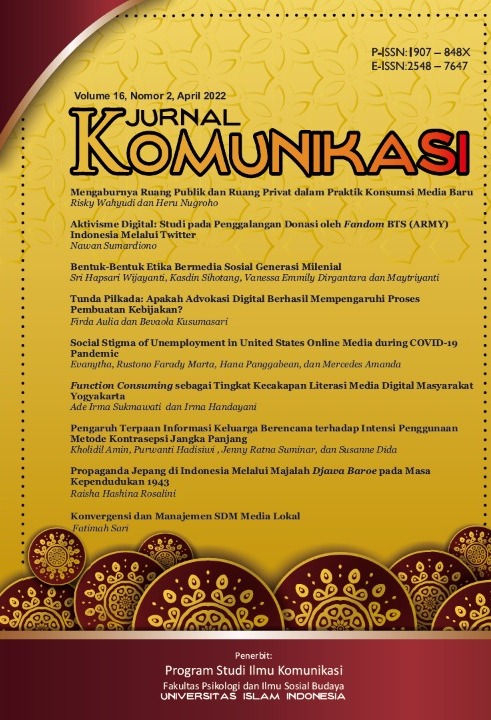Main Article Content
Abstract
This study aims to reveal and identify forms of social media etiquette for the millennial generation in Jakarta. Participants of this study were 268 students at a private university in Jakarta. The social media observed were Facebook, Instagram, WhatsApp, and Line. From the results of distributing online questionnaires, online interviews, documentation, and observations in the lecture and student organizations, it was found that the language used on social media between lecturers and students was formal and informal Indonesian. The language used on social media between students and peers is Indonesian and English, mixed with alay (slang). Social media etiquette includes not offending others, rereading messages before being sent, choosing the right time, choosing polite words for permitting, saying greetings, saying thanks, introducing him/herself, and not interrupting the talk. Nevertheless, etiquette violations are found in using impolite or sarcastic words.
Keywords
Article Details
Copyright (c) 2022 Sri Hapsari Wijaya, Kasdin Sihotang, Vanessa Emmily Dirgantara, Maytriyanti

This work is licensed under a Creative Commons Attribution-NonCommercial-ShareAlike 4.0 International License.
Authors who publish with this journal agree to the following terms:
- Authors retain copyright and grant the journal right of first publication with the work simultaneously licensed under a Creative Commons Attribution License that allows others to share the work with an acknowledgement of the work's authorship and initial publication in this journal.
- Authors are able to enter into separate, additional contractual arrangements for the non-exclusive distribution of the journal's published version of the work (e.g., post it to an institutional repository or publish it in a book), with an acknowledgement of its initial publication in this journal.
- Authors are permitted and encouraged to post their work online (e.g., in institutional repositories or on their website) prior to and during the submission process, as it can lead to productive exchanges, as well as earlier and greater citation of published work (See The Effect of Open Access).
References
- Astajaya, I. K. M. (2020). Etika komunikasi di media sosial. Widya Duta, 15(1), 81–95.
- Bertens, K. (2013). Etika. Yogyakarta: Kanisius.
- Cahyono, A. S. (2016). Pengaruh media sosial terhadap perubahan sosial masyarakat di Indonesia. Publiciana, 9(1), 140–157.
- Chaer, A. (2010). Kesantunan berbahasa. Jakarta: Rineka Cipta.
- Chrystal, D. (2006). Language and the internet (Cambrdige). New York.
- Fahrimal, Y. (2018). Netiquette: Etika jejaring sosial geneasi milenial dalam media sosial. Jurnal Penelitian Pers Dan Komunikasi Pembangunan, 22(1), 69–78.
- Kompas. (n.d.). Social media: Friend or foe? Kompas, p. 7.
- Leech, G. N. (1993). Principles of pragmatics. New York: Longman.
- Marliadi, R. (2019). Tindak tutur ekspresif pujian dan celaan terhadap pejabat negara di media sosial. JURNAL BAHASA, SASTRA DAN PEMBELAJARANNYA (JBSP), 9(2), 132–141.
- Mutiah, T., Albar, I., Fitriyanto, & A.Rafiq. (2019). Etika Komunikasi Dalam Menggunakan Media Sosial. Global Komunika, 1(1), 14–24.
- Retrieved from https://core.ac.uk/download/pdf/287201763.pdf
- Pertiwi, W. K. (2019). Separuh penduduk Indonesia sudah “melek” media sosial. Retrieved from https://tekno.kompas.com/read/2019/02/04/19140037/separuh-penduduk-indonesia-sudah-melek-media-sosial.
- Searle, J. R. (1969). Speech act. London: Cambridge University Press.
References
Astajaya, I. K. M. (2020). Etika komunikasi di media sosial. Widya Duta, 15(1), 81–95.
Bertens, K. (2013). Etika. Yogyakarta: Kanisius.
Cahyono, A. S. (2016). Pengaruh media sosial terhadap perubahan sosial masyarakat di Indonesia. Publiciana, 9(1), 140–157.
Chaer, A. (2010). Kesantunan berbahasa. Jakarta: Rineka Cipta.
Chrystal, D. (2006). Language and the internet (Cambrdige). New York.
Fahrimal, Y. (2018). Netiquette: Etika jejaring sosial geneasi milenial dalam media sosial. Jurnal Penelitian Pers Dan Komunikasi Pembangunan, 22(1), 69–78.
Kompas. (n.d.). Social media: Friend or foe? Kompas, p. 7.
Leech, G. N. (1993). Principles of pragmatics. New York: Longman.
Marliadi, R. (2019). Tindak tutur ekspresif pujian dan celaan terhadap pejabat negara di media sosial. JURNAL BAHASA, SASTRA DAN PEMBELAJARANNYA (JBSP), 9(2), 132–141.
Mutiah, T., Albar, I., Fitriyanto, & A.Rafiq. (2019). Etika Komunikasi Dalam Menggunakan Media Sosial. Global Komunika, 1(1), 14–24.
Retrieved from https://core.ac.uk/download/pdf/287201763.pdf
Pertiwi, W. K. (2019). Separuh penduduk Indonesia sudah “melek” media sosial. Retrieved from https://tekno.kompas.com/read/2019/02/04/19140037/separuh-penduduk-indonesia-sudah-melek-media-sosial.
Searle, J. R. (1969). Speech act. London: Cambridge University Press.




